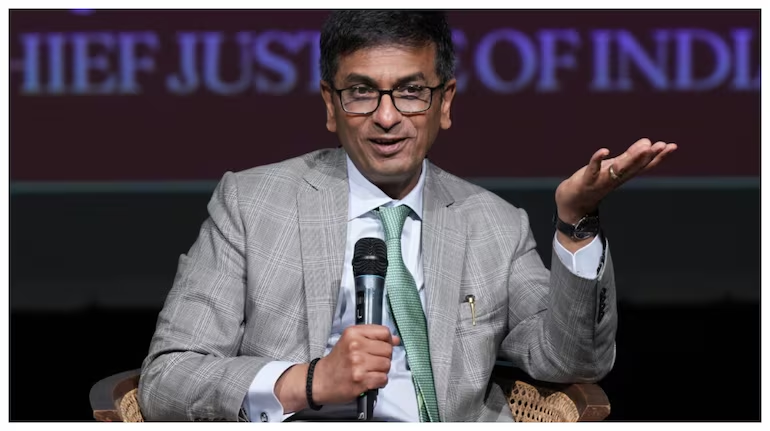
Introduction
The Chief Justice of India (CJI) DY Chandrachud holds one of the most prestigious and influential positions in the Indian judiciary. As the head of the Supreme Court, his role is central to upholding the Constitution and ensuring justice in the country. Recently, however, CJI Chandrachud found himself at the center of a rather bizarre and concerning incident involving cybercrime. A scammer, impersonating him on social media, sent out a message requesting ₹500 for a cab fare, claiming to be stranded in Delhi. This incident has not only captured public attention but also highlighted the growing threat of cyber scams targeting even the most prominent figures in society.
The Incident Explained
The incident in question unfolded when a scammer created a social media handle, falsely representing themselves as CJI DY Chandrachud. The fraudster sent a message to a user, requesting a mere ₹500 to cover a cab fare, citing an urgent need to attend a Collegium meeting at the Supreme Court. The message was designed to appear authentic, even including the phrase “Sent from iPad” to add a touch of legitimacy. The scammer claimed to be stuck at Connaught Place, a central location in Delhi, and asked the recipient to transfer the money.
What made this scam particularly shocking was the audacity of the impersonation. The message quickly went viral on social media, leading to widespread disbelief and concern. Recognizing the potential damage such an incident could cause, the Supreme Court promptly filed a cybercrime complaint with the Delhi Police. The complaint was lodged to not only protect the reputation of CJI Chandrachud but also to send a strong message against such fraudulent activities.
The Response from Authorities
In response to the incident, the Supreme Court’s security department, under the direction of CJI Chandrachud, took immediate action. The cybercrime branch of the Delhi Police was brought in to investigate the matter. This quick response underscores the seriousness with which the judiciary and law enforcement agencies treat such impersonation cases. Cybercrime has been on the rise globally, and incidents like these highlight the need for robust cybersecurity measures, especially when public figures are targeted.
The investigation aims to track down the scammer and hold them accountable for their actions. This case also serves as a reminder that even those in the highest offices are not immune to the threats posed by cybercriminals. The authorities’ swift action is crucial not only for bringing the perpetrator to justice but also for deterring future scams of a similar nature.
Broader Implications
The incident involving CJI Chandrachud has broader implications that extend beyond the immediate case. Cybercrime, particularly involving impersonation of high-profile figures, is a growing concern in today’s digital age. The ease with which scammers can create fake profiles and solicit money highlights the vulnerabilities in our online interactions. This incident is a stark reminder that no one is immune to cyber threats, not even the Chief Justice of India.
Moreover, such scams erode public trust in institutions and individuals. When a figure as prominent as the CJI is impersonated, it can cause confusion and mistrust among the public. This is particularly concerning in a country like India, where the judiciary is seen as a pillar of democracy. The implications of such scams can be far-reaching, affecting not only the individuals involved but also the perception of the institutions they represent.
Public and Media Reactions
The incident has sparked significant media coverage and public discourse. News outlets quickly picked up the story, with many highlighting the audacity of the scammer and the implications of such an impersonation. Social media platforms were abuzz with discussions about the incident, with many expressing shock that even the Chief Justice could be targeted in such a manner.
Legal experts and cybersecurity professionals have weighed in on the incident, emphasizing the need for greater vigilance and stronger cybersecurity protocols. Public reactions have ranged from disbelief to concern, with many urging for stricter penalties for cybercriminals who engage in such fraudulent activities.
Lessons Learned and Preventive Measures
This incident serves as a critical lesson in the importance of online security and the need for individuals to be cautious when interacting on digital platforms. The ease with which the scammer was able to impersonate CJI Chandrachud highlights the vulnerabilities that exist in our current digital infrastructure. It underscores the need for public figures and institutions to implement stronger security measures to protect against such impersonation attempts.
For the general public, this incident is a reminder to always verify the authenticity of any requests for money or personal information, especially when they come from unexpected or suspicious sources. Being vigilant and skeptical of unsolicited messages can help prevent falling victim to such scams.
Conclusion
The impersonation of CJI DY Chandrachud is a troubling incident that highlights the growing threat of cybercrime in today’s digital age. While the swift response from the Supreme Court and law enforcement is commendable, this case serves as a reminder of the importance of cybersecurity and the need for vigilance. As we continue to navigate the complexities of the digital world, it is crucial that both individuals and institutions take proactive steps to protect themselves from such threats.
Call to Action
As readers, we invite you to share your thoughts on this incident in the comments below. Have you ever encountered similar scams, or do you have suggestions on how to improve online security? Let’s engage in a conversation about the steps we can take to protect ourselves and our institutions from the growing threat of cybercrime. Additionally, stay informed and stay safe by following trusted news sources and being vigilant in your online interactions.







